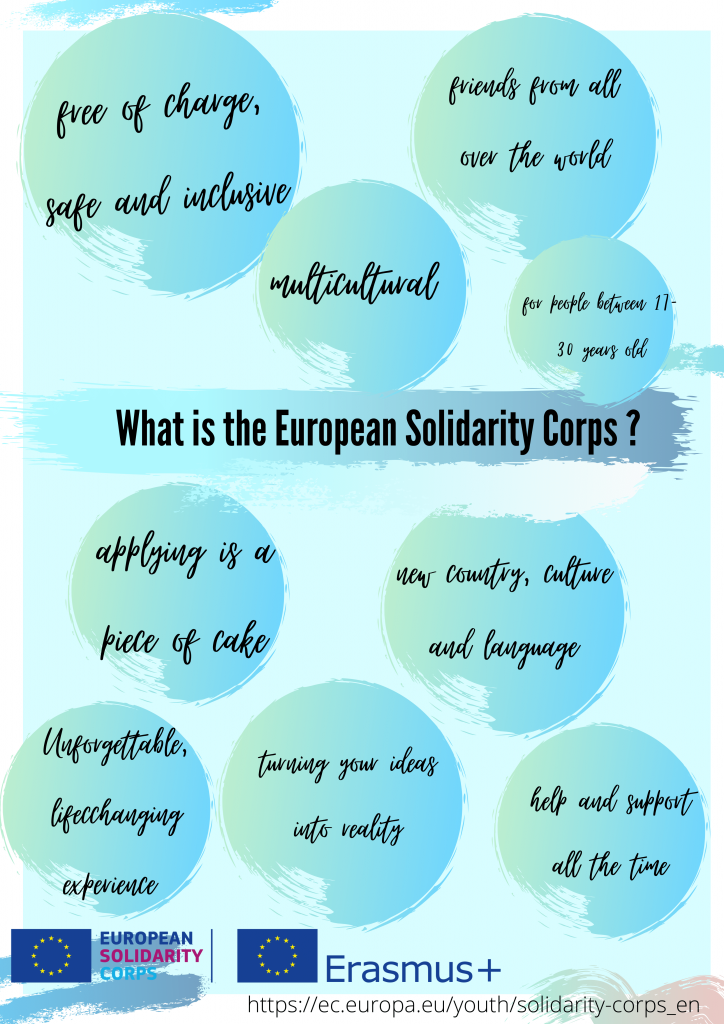European Solidarity Corps (ESC) is a unique opportunity for young people to volunteer in various projects around Europe, where they could contribute to local communities and people. You can volunteer in different areas, for instance, culture and art, sports, environmental protection, activities with children, social care for the elderly, the disabled, immigrants and many more.
If you are between 18-30 years old, eager to help others and change the world and yourself, do not miss a chance to join ESC. It is funded by the European Commission thus, this program is free of charge. The accommodation, food, travel tickets, pocket money, insurance will be covered. There are short-term (up to 2 months) and long-term projects (up to 1 year).
There are three parties involved in every ESC project: a volunteer, sending organization and hosting/coordinating organization. The sending organization prepares, helps and trains participants before departure, mediates between you and the host organisation and provides you support upon return from the mobility while hosting/coordinating organization hosts a participant, develops a programme of activities, supports and guides during the project.
If you meet the criteria for ESC volunteering here are 5 steps which will help you get involved in the ESC project:
1. Find a sending organization that will arrange the sending and help you with information and documents. The sending organization is responsible for: negotiating the terms of your volunteering with the hosting organization, assisting you in preparation, applying for a European Commission grant to cover your costs, keeping in touch with you during your staying in another country.
2. Register for the European Solidarity Corps Portal to find a hosting organization that agrees to accept you as a volunteer. Registration does not mean that you have to participate right away. Fill in your profile information and look for the projects you are most interested in. Decide what you would like to do and where you would like to go. Your sending organization can help you to find a suitable project as well.
3. Then you are required to send your CV together with a motivation letter to the hosting organization. In some cases, you may also have to complete a questionnaire. Be aware that many of them might not reply to you back. Send more requests so you would have the higher chances to be accepted.
CV should be well-structured and outline your education, work experience, social activities, competencies, language skills, computer knowledge, personal qualities, interests, and hobbies.
The motivation letter describes why you are the perfect candidate for a particular volunteering position. Tell about yourself, share your thoughts and feelings about the project you are applying for, bring your ideas, what you would like to learn, and what you could offer for the local community. Do not be afraid to be creative when you are writing the motivation letter. Try to design it artistically and originally, for example, in the form of a PowerPoint or Prezi presentation, an article from a magazine, or even a video. It will increase your chances to be chosen by the host organization.
4. Some hosting organisations would like to have an online interview to know you better. During the interview be sincere in your answers and find a unique point that can differentiate you from other candidates. It is important to ask the hosting organisation related to the project questions as you are going to work with them for some period of time.
5. Get ready! Once you have been accepted you should start preparing documents. As mentioned above the sending organisation would take care of the most documents and you have to fill in all the forms carefully. Some countries require to obtain a visa before entering their country, so take into consideration that you have to get it as well. Before departure, learn more about the country you are going to volunteer in, choose something that you would like to bring from your country to present your culture and cuisine, pack your luggage and embark on your new journey.
Being an ESC volunteer is a life-changing experience. You get a chance not only to live and work in another country and help the local community but also to find new friends, travel, discover new things, learn more about others and yourself. Without a doubt, the European Solidarity Corps helps young people to improve their cultural awareness, self-management skills and knowledge as well as fosters their personal development.
Article written by the IRTEA’s European Solidarity Corps volunteers – Project “Volunteers United in Diversity”


